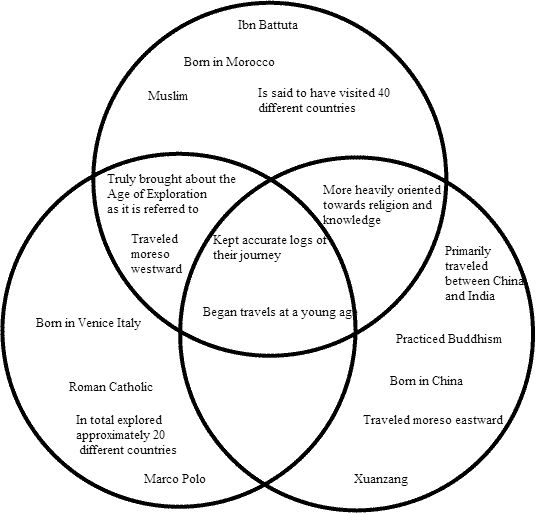Similarities exhibited by all three explorers are the ultimately achievements of their voyages and travels. All three explorers connected the: culture, ideas, innovations, and technologies of the East and West world. This increased connection and understanding of outer regions allowed the start of globalization and the increase of trade, as well as being the first step in the age of exploration influencing other great explorers such as Christopher Columbus. Differences between the three explorers were found in the culture and perspective at which they entered their travels in. Ibn Battuta was a Muslim from North Africa, Xuanzang a Buddhist from China, and Marco Polo a Catholic from Venice. These different cultural backgrounds offered a different perspective for each traveler along their voyages (for example Marco Polo being a Catholic, had a positive bias in his writing toward all those he me who practiced Christianity). Other differences were the routes and regions each of the the travelers took, Xuanzang traveled through primarily South East Asia, Marco Polo traveled through Persia, Central Asia, and China, and finally Ibn Battuta had the most vast travels through North Africa, Southern Europe, Persian, China And most of the Eurasian and central Asian regions. The different travels sought by these three explorers, gave each of them different ideas, culture and goods to bring back to their respective regions.
- Unit 1
- 1.1.3: Tools and Adaptation>
- 1.3.9 & 1.3.2: New Religions & Geographies of Early Civs.>
- 1.1.2: Humans and Fire>
- 1.3.6: Arts & Record Keeping>
- 1.3.1-1.3.3: Early Culture & Systems of Rule>
- 1.1-1.4 Early Human Innovation>
- 1.2.1-1.2.3: The Climate & The Neolithic Era>
- 1.2.5-1.2.6: Reliable Food Sources & Innovation>
- 1.3.1-1.3.2: Pastoralists & Early Architecture>
- Unit 2
- 2.2.5-2.2.7 Social Hierarchy and Gender Roles>
- 2.2.4 Cities>
- 2.2.2 Orchestration of the Persian and S. Asian Empires>
- 2.2.2 Orchestration of Rome and China>
- 2.2.1: Growth of Empires & States>
- 2.1.6 Cultures Of Second Wave Civilizations>
- 2.1.1: Religions as a Bonding Force>
- 2.1.4 Buddhism and Hinduism Impact on Gender Roles>
- 2.1.2 The Emergence of Religions>
- Unit 3
- 3.1.1 Third Wave Global Trade Routes>
- 3.1.2 The Impact of trade on emerging trading cities>
- 3.1.3. Spread of Islam Through Afro-Eurasia>
- 3.1.4 Inter-Regional Travelers >
- 3.1.5. Cultural Interactions and Art>
- 3.1.6: The Impact of Newly Spread Technologies and Scientific Knowledge>
- 3.1.7 Inter-Regional Conflicts>
- Unit 4
- 4.1.1. - Influence of Tools Upon Transoceanic Trade>
- 4.1.2: Maritime Reconnaissance>
- 4.1.3 World Economies>
- 4.1.4 The Colossal Impact of the Colombian Exchange>
- 4.1.5 Government and the Arts>
- 4.2.3 Forced Migration of Africans Cause and Effect>
- 4.3.2 Impact of Technology on state consolidation and imperial expansion>
- Unit 5
- Unit 6

